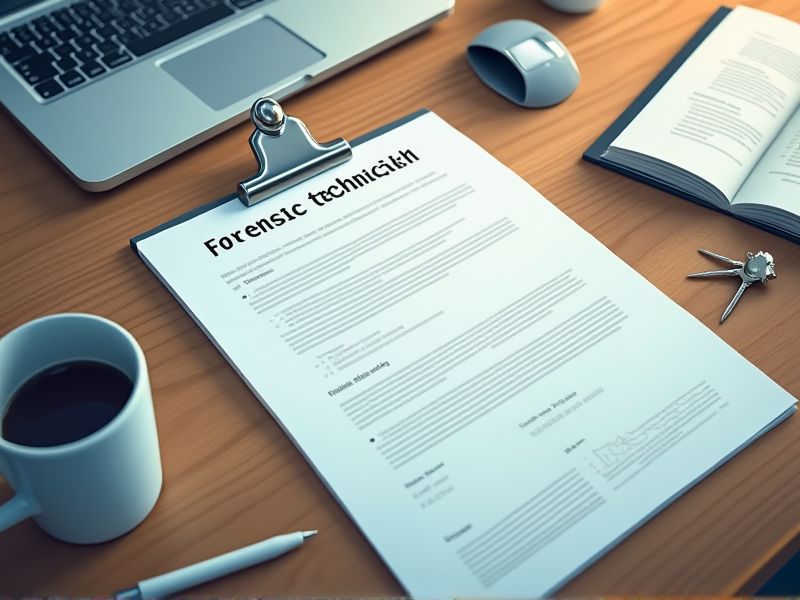
Forensic science technicians must ensure precision and reliability in evidence analysis, which is crucial for upholding justice. Certifications validate their expertise, equipping them with the skills necessary to handle complex forensic tasks. Legal standards and technological advancements necessitate continuous learning and adherence to best practices. These are some key certifications you might need as a forensic science technician.
IAI Certified Crime Scene Investigator (CCSI)
The IAI Certified Crime Scene Investigator (CCSI) credential ensures that forensic science technicians possess expert-level knowledge and skills necessary for accurate crime scene analysis. The certification validates proficiency in evidence identification, collection, and preservation, which are crucial for maintaining the integrity of forensic investigations. A CCSI designation enhances credibility in legal proceedings, allowing technicians to provide expert testimony that withstands scrutiny. The certification process involves rigorous training and evaluation, ensuring that technicians remain up-to-date with the latest methodologies and ethical standards in forensics.
IAI Certified Latent Print Examiner
IAI Certified Latent Print Examiners are essential because they ensure higher standards of accuracy in identifying fingerprints. Their certification verifies expertise, reducing the risk of errors during forensic analysis. Proper identification and analysis by certified examiners support the validity of evidence in legal cases. By maintaining this certification, forensic technicians can enhance their credibility and reliability in their field.
American Board of Criminalistics (ABC) Certification
The ABC Certification ensures that forensic science technicians adhere to rigorous industry standards, which enhances the credibility of their work. As forensic evidence is critical in legal proceedings, this certification verifies a technician's expertise, ensuring that their analyses and conclusions are reliable. With the certification, technicians often gain access to more career opportunities and professional advancement within the field. State and federal agencies prioritize certified individuals to maintain integrity and trust in forensic investigations.
EnCase Certified Examiner (EnCE)
EnCase Certified Examiner (EnCE) certification equips forensic science technicians with specialized skills in digital investigations, increasing their proficiency in handling electronic evidence. A recognized certification like EnCE enhances credibility, making technicians more competitive in the field of digital forensics. The structured training offered through the EnCE program ensures that technicians stay updated on the latest methodologies and tools used in cybercrime investigations. Employers often seek EnCE-certified professionals to ensure that digital evidence is processed and analyzed accurately, ensuring reliability in legal proceedings.
Certified Computer Examiner (CCE)
A Certified Computer Examiner (CCE) is needed in forensic science to ensure the accurate recovery of digital evidence. Expertise in CCE enhances the reliability of electronic data during legal investigations. CCE certification ensures forensic technicians comply with legal standards and ethical guidelines. CCE knowledge aids in efficiently analyzing complex digital footprints, leading to more successful case resolutions.
AFTE Certified Firearms Examiner
Having an AFTE Certified Firearms Examiner ensures the technician has specialized knowledge in firearms identification, crucial for accurate forensic analysis. This certification enhances the examiner's ability to discern crucial details in ballistic evidence, leading to more reliable court testimonies. Rigorous training associated with this certification increases the probability of solving gun-related crimes by correctly matching bullets to weapons. Possessing this certification also reflects a standardized level of expertise, fostering trust and credibility within the judicial system.
Certified Digital Forensics Examiner (CDFE)
Forensic science technicians rely on Certified Digital Forensics Examiners to accurately analyze and interpret digital evidence, crucial in solving criminal cases involving electronic data. An increasing amount of criminal activity occurs in digital environments, making CDFEs essential for navigating the complex digital landscape to uncover critical information. CDFEs possess specialized skills that help preserve the integrity of digital evidence, ensuring it is admissible in court and withstands legal scrutiny. Knowledge from certified examiners assists forensic teams in maintaining the chain of custody, crucial for the prosecution's case in demonstrating a clear path of evidence handling.
Certified Forensic Interviewer (CFI)
Certified Forensic Interviewers (CFIs) are essential for forensic science technicians because they specialize in obtaining reliable information through structured interviews. A CFI's expertise helps ensure that witness and suspect statements are accurate and legally admissible. Their skills in detecting deception and understanding psychological cues greatly support evidence gathering. Partnering CFIs with forensic science technicians enhances the overall effectiveness of criminal investigations.
Forensic Toxicology Certification (FTC)
Forensic toxicology certification ensures a forensic science technician possesses the expertise to accurately analyze and interpret toxic substances in biological samples. When certified, technicians adhere to standardized protocols, enhancing the reliability of their findings in legal contexts. Certification raises a technician's professional credibility, often leading to better career advancement and job opportunities. In complex cases involving intoxication or poisoning, certified experts provide crucial, scientifically-validated evidence that supports judicial processes.
Forensic DNA Analysis Certification
Forensic DNA Analysis Certification ensures that forensic science technicians possess the necessary skills for analyzing biological evidence accurately. As new DNA technologies evolve, certification helps maintain proficiency in the latest methodologies and serves as a benchmark for quality. Courts demand reliable and validated results, and certified technicians are more likely to produce admissible and credible evidence. Certification enhances professional development and career opportunities, positioning technicians as experts in the forensic community.
Summary
When you as a forensic science technician obtain certifications, you often enhance your credibility and marketability in the job market. Certified technicians can expect an increase in job opportunities and access to a broader range of roles within the field. Employers may perceive you as more skilled and reliable, leading to potential salary increases and career advancement. Certifications may provide you with specialized knowledge that improves your problem-solving abilities and effectiveness in investigations.
